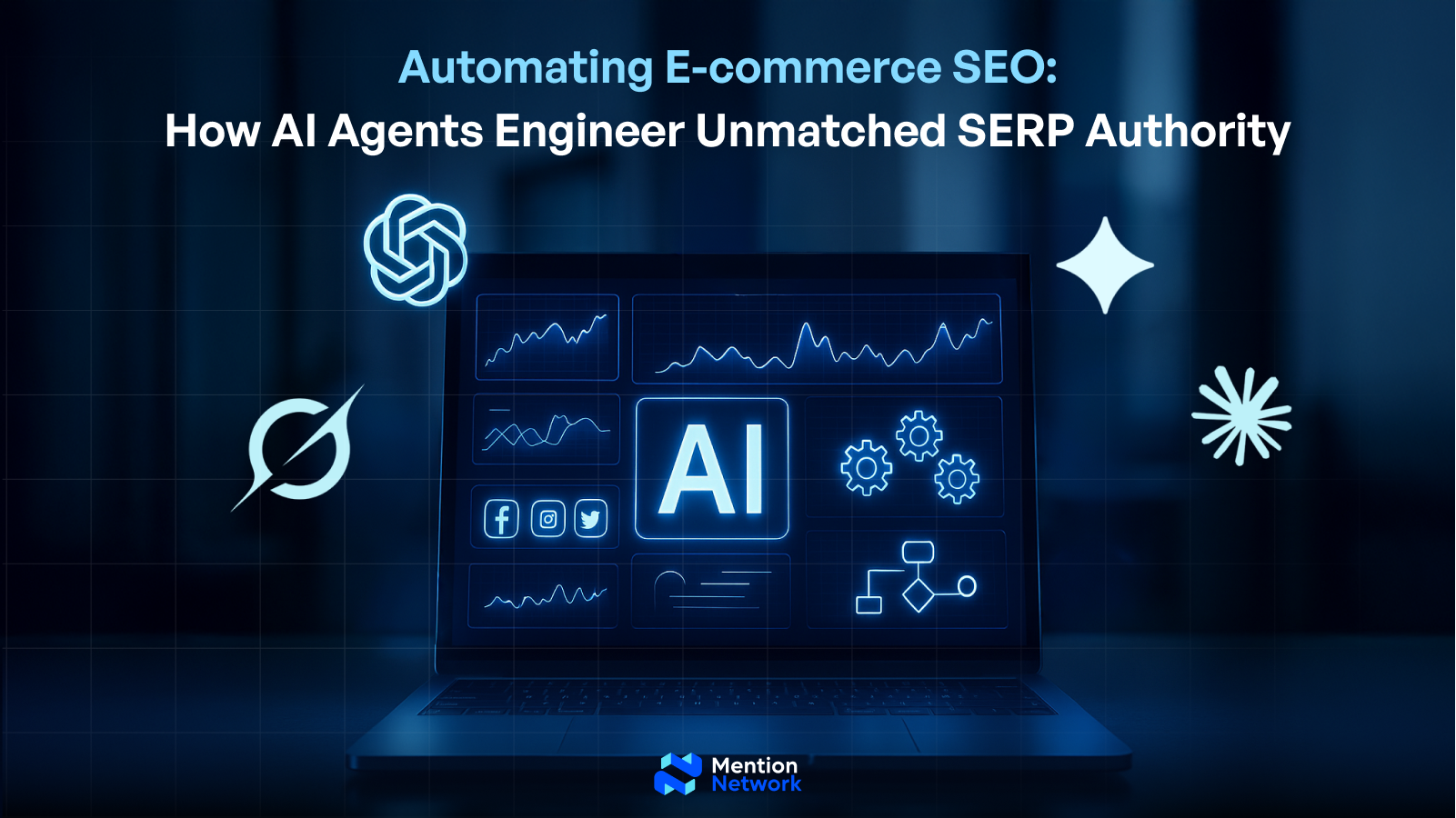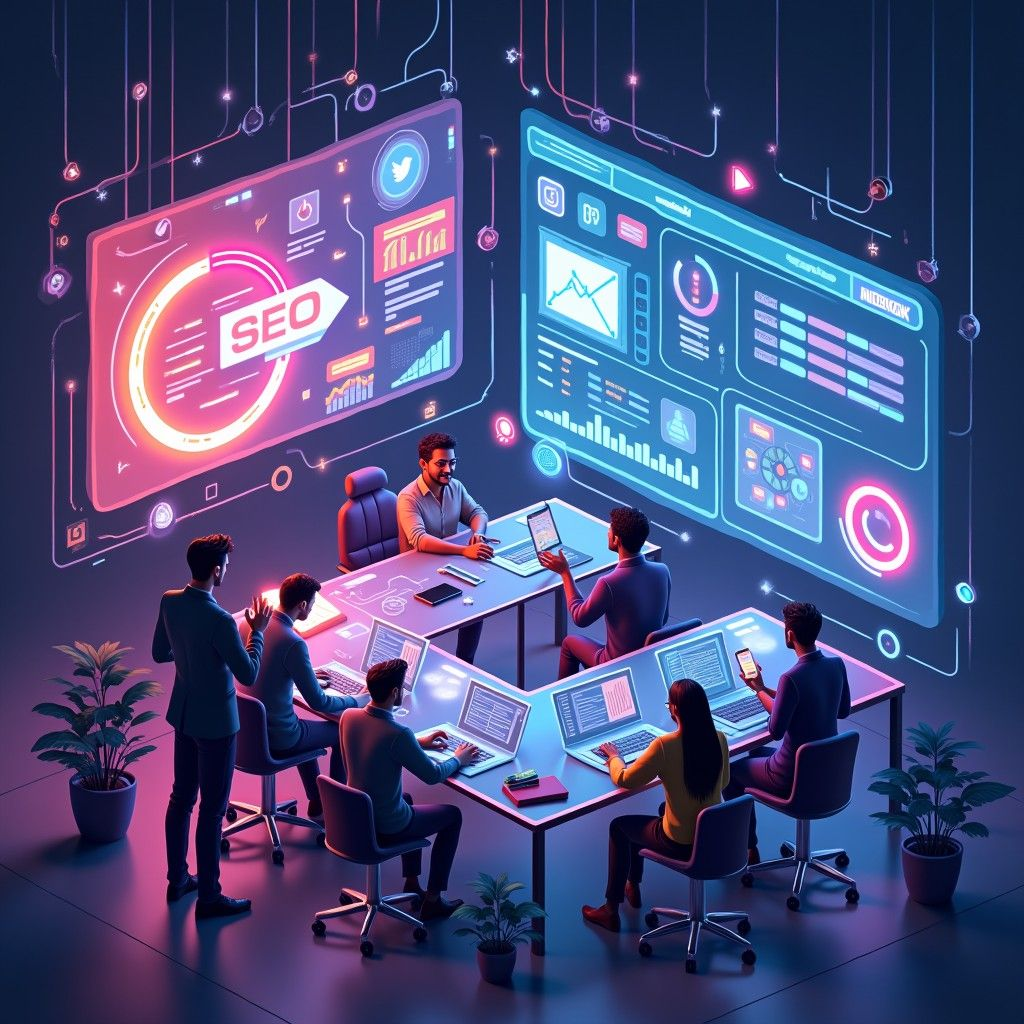Automating E-commerce SEO: How AI Agents Engineer Unmatched SERP Authority

The world of e-commerce is a fiercely competitive battlefield, and the coveted top spots on Search Engine Results Pages (SERPs) are the ultimate prize. For years, SEO has been a manual, painstaking process, requiring a mix of technical expertise, content creation, and constant monitoring. But what if your SEO strategy could not only adapt instantly but also proactively hunt for optimization opportunities, autonomously?
Enter AI Agents. These aren't just Large Language Models (LLMs) writing content, they are sophisticated, goal-driven software entities designed to perceive their environment, make decisions, and take actions to achieve specific objectives. When unleashed on e-commerce SEO, they become the intelligent, tireless strategists your business needs. Transforming SEO from a reactive maintenance task into a proactive, adaptive growth engine, helping you increase brand visibility
Now, we’ll dive into six powerful, actionable strategies for leveraging this technology, moving beyond theoretical hype to provide a clear roadmap for marketers, developers, founders, and investors looking to secure dominant SERP rankings and drive exponential growth.
Key Takeaways
- AI Agents are goal-driven and autonomous: They can perceive the SEO environment, make decisions, and execute complex optimization tasks without constant human intervention.
- The focus is on proactive adaptation: AI agents enable real-time adjustments to content, technical SEO, and competitive analysis, moving beyond traditional, reactive SEO.
- They master long-tail keyword targeting: Agents excel at identifying and creating hyper-specific content clusters that capture high-intent, low-competition traffic.
- Technical SEO is automated: From identifying crawl errors to optimizing site speed and internal linking, agents ensure a flawless technical foundation for indexing.
- The future of e-commerce is AI optimization: Businesses not integrating AI Agents risk being outpaced by competitors with self-optimizing digital storefronts.
1. Autonomous Long-Tail Keyword and Content Cluster Generation

AI Agents are mastering the art of scaling content by autonomously identifying niche, high-intent long-tail keywords and building comprehensive, topically authoritative content clusters faster and more effectively than human teams alone.
The majority of search traffic and conversions don't come from a handful of popular, highly competitive head terms (like "buy shoes online"). Instead, they reside in the long tail: the millions of unique, specific phrases (e.g., "waterproof hiking boots for wide feet men's size 12"). Traditionally, identifying and creating content for these niches has been a slow, painstaking process.
An AI Agent deployed for content optimization works in a continuous loop:
- Intent Mapping: The agent analyzes real-time user data, search console queries, competitor SERP results, and forum discussions to identify unmet user needs and high-conversion intent gaps.
- Keyword Clustering: It doesn't just list keywords, it groups them semantically into topical authority clusters. For a product like a coffee machine, the cluster would include terms like "best grind settings", "cleaning a French press" and "cold brew vs. pour-over comparison."
- Autonomous Content Generation: Using sophisticated large language models (LLMs) and structured data inputs (product specs, customer reviews), the agent generates the required content (product descriptions, category pages, blog posts) tailored for both user experience and semantic SEO relevance.
- A/B Testing and Refinement: Crucially, the agent can then push variations of this content live, track their performance against SERP ranking and conversion goals, and automatically refine the copy, titles, and meta descriptions for maximum impact.
Why it matters: This strategy shifts the focus from winning a few battles (head terms) to dominating the entire war (comprehensive topical authority). For an e-commerce founder or developer, deploying an agent for this means an exponentially growing content footprint without linearly scaling the content team, which directly helps increase brand visibility.
2. Real-Time Technical SEO Auditing and Remediation
Crawl errors, broken links, or poor site speed destroy brand visibility. AI Agents audit and fix them instantly optimizing Core Web Vitals, schema markup, and internal linking. Unlike standard SEO tools, an ai visibility tool acts, not just reports. It ensures your e-commerce store stays index-ready 24/7.
A dedicated Technical SEO Agent is granted read/write access to the e-commerce platform's core infrastructure (CMS, CDNs, site code):
- Continuous Health Check: The agent constantly monitors crucial Core Web Vitals (CWV) metrics like Largest Contentful Paint (LCP) and Cumulative Layout Shift (CLS) across the site.
- Automated Remediation: When a problem is detected (e.g., a specific product page has a poor LCP due to a large unoptimized image), the agent doesn't just log the error. It can automatically compress the image, adjust lazy loading settings, or even modify the CSS bundle, deploying the fix instantly via a staging environment check and then to production.
- Schema Markup and Internal Linking: The agent ensures every product and category page utilizes the most current, comprehensive Schema markup (Product, Offer, Review Snippets) to maximize rich snippet eligibility. Furthermore, it dynamically adjusts internal linking structures based on traffic flow and content authority to pass PageRank more effectively and guide search engine crawlers.
Opinion: Ignoring technical SEO automation is arguably the biggest mistake a scaling e-commerce business can make. While content brings the traffic, technical excellence ensures the search engine can actually find, index, and confidently rank that content. The autonomous nature of the agent provides a zero-latency defense against technical decay, acting as a crucial element in an effective ai visibility tool.
3. Proactive Competitive SERP Strategy and Adaptation

Unlike manual competitor analysis that is always retrospective, AI Agents continuously track the SERP movements of key rivals, identifying and exploiting immediate ranking vulnerabilities and trends before they become established.
Winning at SEO isn't just about what you do well, it's about anticipating and neutralizing what your competitors are doing. An AI Agent acts as an ever-vigilant SERP spy, providing a predictive layer to your strategy.
The Competitive Strategy Agent focuses on pattern recognition and real-time response:
- SERP Feature Monitoring: The agent tracks all competitors for target keywords, logging changes in their titles, meta descriptions, image usage, and critically, their success in capturing SERP features like Featured Snippets, People Also Ask (PAA), and Review Carousels.
- Vulnerability Exploitation: If a competitor gains a Featured Snippet, the agent doesn't simply flag it. It immediately analyzes the competitor's content structure, identifies the specific paragraph/answer format that won the snippet, and directs the content generation agent to create a superior, more concise answer in the correct format on your equivalent page, often achieving a rapid "snippet flip."
- New Keyword Discovery: When a competitor launches a new product line or content piece, the agent reverse-engineers the keywords they are targeting and immediately initiates a rapid response optimization cycle for your own relevant offerings.
This capability translates directly into accelerated Market Share Capture (MSC). The ability to react in hours rather than weeks to a competitor's successful SEO move is a definitive competitive advantage that ensures the marketing budget provides maximum, immediate return, making the agent an essential ai visibility tool.
4. Intelligent Personalization for Category and Product Page Optimization
AI Agents can dynamically optimize category and product pages based on user behavior and segmentation, moving beyond static SEO copy to create personalized, high-converting experiences that search engines increasingly reward.
Traditional e-commerce SEO often results in generic, keyword-stuffed category and product descriptions. This might appeal to a crawler, but it rarely delights the user or drives a conversion. Modern SEO rewards pages that demonstrate high engagement, low bounce rates, and a high time-on-page metrics that AI-driven personalization can boost dramatically.
This optimization strategy involves leveraging user data for content variation:
- Segmented Copy Generation: The agent classifies users into buckets (e.g., "first-time visitors," "price-sensitive shoppers," "brand enthusiasts," "repeat buyers"). Based on these segments, it can present slightly different versions of the introductory category page text, product highlights, and even the review summaries.
- Example: A "price-sensitive" segment sees copy highlighting value, bundles, and free shipping at the top of a category page. A "brand enthusiast" sees copy focused on quality, heritage, and limited edition items.
- Dynamic Image Tagging: The agent optimizes image alt-text and file names not just for one core keyword but for the entire semantic cluster based on the user's inferred intent, improving the chances of ranking in Google Images and local search.
- Hyper-Localized Optimization: For businesses with physical stores or region-specific products, agents can inject hyper-local keywords (city, neighborhood, nearby landmarks) into the copy for users searching from specific geographic areas, dramatically improving local pack rankings.
This fusion of CRO (Conversion Rate Optimization) and SEO is the next frontier. By making pages more relevant and engaging for the user, AI Agents effectively signal to the search engine that this is the best, most valuable result for a given query, which in turn helps increase brand visibility.
5. Automated Backlink Strategy and Outreach Prioritization
AI Agents are being deployed to streamline and focus the notoriously inefficient process of link building, identifying the highest-impact, most relevant linking opportunities and automating personalized outreach to secure valuable domain authority.
Backlinks remain a critical signal of a website's authority and trustworthiness. However, manual link building is resource-intensive and often yields diminishing returns. An intelligent agent transforms this process from a wide-net fishing expedition into a precision targeting operation.
The Link Strategy Agent uses predictive analytics to optimize link acquisition:
- Authority and Relevance Scoring: The agent crawls the web and identifies potential link partners based not just on Domain Authority (DA) but also on topical relevance and co-citation frequency. It calculates a "Link Value Score" that prioritizes the few links that will provide the most significant SEO lift.
- Broken Link and Unlinked Mention Discovery: It continuously scans the web for mentions of the e-commerce brand or its unique product names that haven't been linked. It also scours relevant niche websites for broken external links, identifying opportunities for your content to serve as the replacement.
- Personalized Outreach Drafting: Based on the context of the link opportunity, the agent drafts highly personalized, non-generic outreach emails. For an unlinked mention, it provides the precise URL and mention context. For a broken link, it explains why your piece is the best replacement, accelerating the response and success rate of human outreach teams.
For Marketers and Developers: This functionality is about maximizing human effort. The AI Agent handles the laborious data collection, scoring, and initial personalization, allowing skilled human strategists to focus only on building relationships and closing the most high-value link placements.
6. Predictive SEO Forecasting and Budget Allocation
Beyond current optimization, AI Agents can use machine learning to model the future impact of SEO decisions, allowing investors and founders to confidently allocate budget based on predicted SERP movement, traffic, and revenue gains.
One of the greatest challenges in SEO is proving ROI and forecasting results. Traditional SEO is often a game of educated guesses. AI Agents introduce a level of data-driven predictability that was previously impossible.
The Forecasting Agent builds sophisticated predictive models:
- Causal Modeling: The agent analyzes historical data, correlating specific SEO actions (e.g., optimizing 50 product pages, securing 10 high-DA links) with the resulting changes in rankings, organic traffic, and revenue. It identifies which actions have the greatest causal impact.
- SERP Volatility Simulation: It runs thousands of simulations based on potential search engine algorithm updates, competitive activity, and market seasonality, providing a range of predicted outcomes (best-case, worst-case, most-likely) for the next 6-12 months.
- Optimal Budget Recommendation: Based on the causal model, the agent can recommend the optimal allocation of resources: "To achieve a 20% SERP lift in the 'Shoes' category, invest 60% of the budget in technical optimization and 40% in long-tail content creation." This removes guesswork and enables highly confident, strategic investment.
Opinion: This is the ultimate tool for the investor and founder. It turns SEO from a murky "black box" expense into a quantifiable, highly predictive growth channel, allowing for clear, performance-based budgeting and demonstrating a clear path to market dominance. The agent here functions as a high-level, strategic ai visibility tool.
Conclusion: The Autonomous Future of E-commerce
The deployment of AI Agents in e-commerce SEO is not a futuristic concept, it is happening now, and it is fundamentally changing the competitive landscape. These autonomous systems represent an inflection point, pushing SEO beyond simple keyword management into the realm of proactive, adaptive, and intelligent growth strategy.
The companies that succeed in the next five years will be the ones that view their e-commerce storefronts not as static websites but as self-optimizing digital ecosystems. By mastering the six strategies outlined here from autonomous content clustering to predictive forecasting marketers, developers, and founders can build an unfair advantage.
This shift empowers human teams to move away from repetitive, low-impact tasks and focus on high-level strategy, product innovation, and customer experience, knowing their SERP presence is being tirelessly and intelligently optimized 24/7. The question is no longer if you will adopt AI Agents for SEO, but how quickly you will deploy them before your competitors automate their way to the top of the rankings.
Frequently Asked Questions (FAQ) about AI Agents in SEO
Do AI Agents replace SEO professionals?
No, they augment them. Agents handle repetitive, time-consuming tasks. Professionals focus on high-level strategy and data interpretation.
What is the main difference between using an AI Agent and a standard SEO tool?
Tools are analytical (tell you what to fix). Agents are autonomous (make decisions and execute fixes themselves).
Best starting point for a small business?
Start with Technical SEO Auditing (Strategy 2) for a solid Core Web Vitals foundation, then move to Autonomous Long-Tail Content Generation (Strategy 1).

